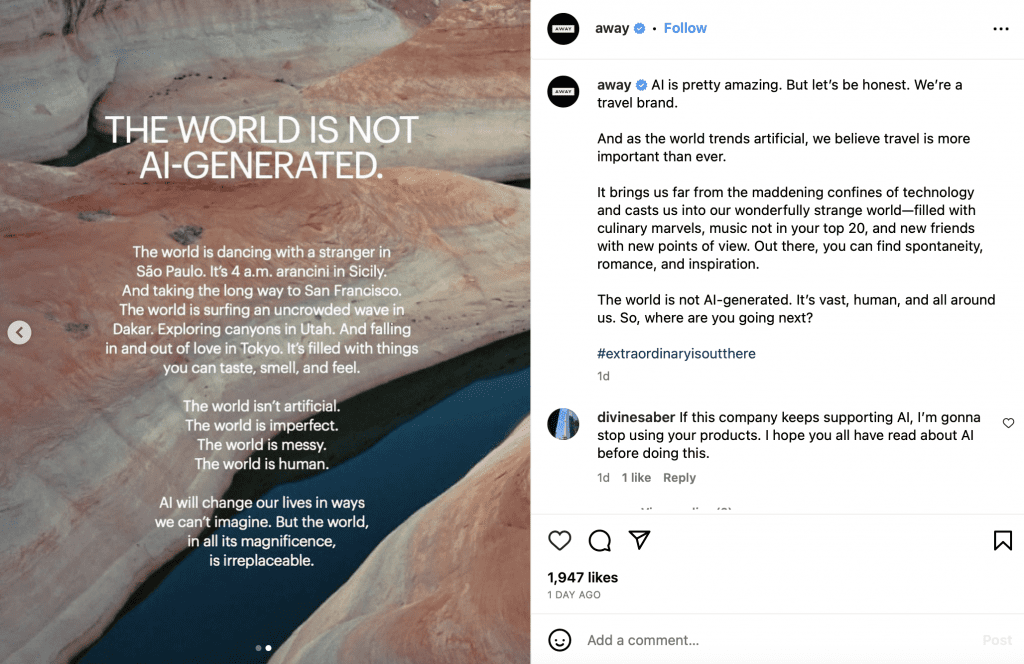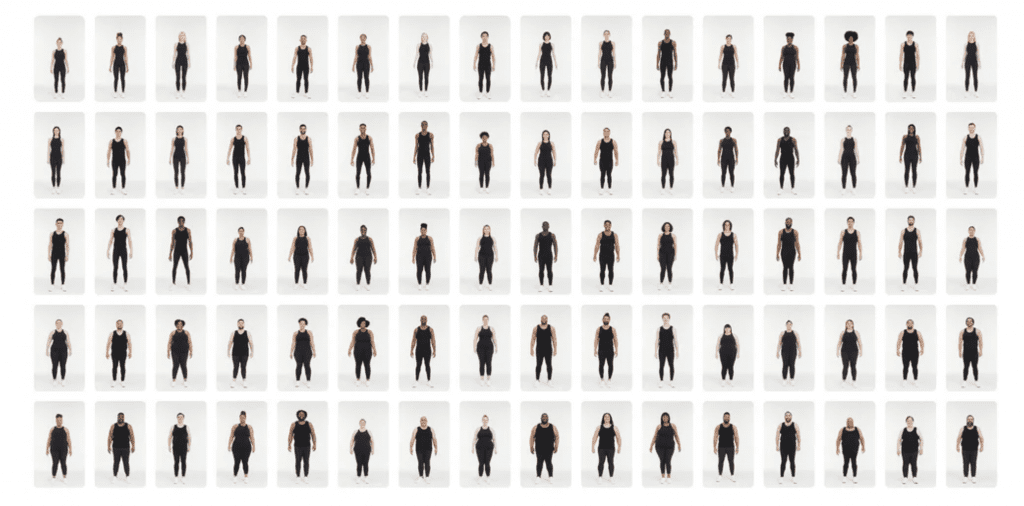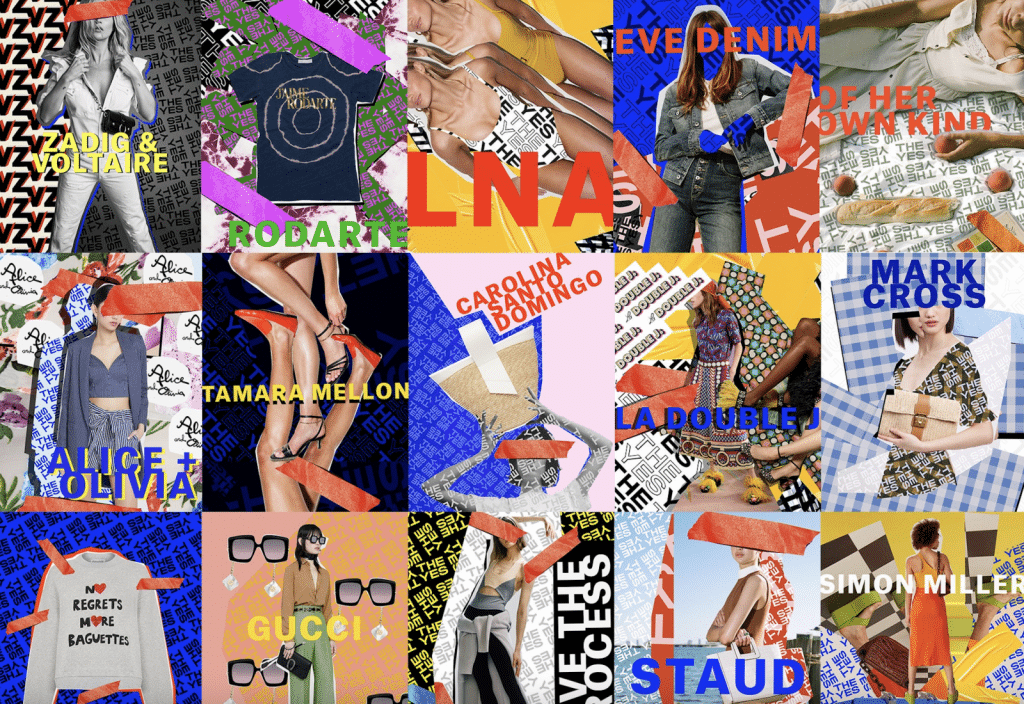Companies across industries have been investing in and making use of machine learning/artificial intelligence (“AI”) to varying extents for years, with some of the most immediate use cases in retail being AI-driven personalized product recommendations, optimized pricing, inventory monitoring, and automatic product cataloguing, the latter of which was teased by Farfetch several years ago. So, while AI is not a new type of technology, the implementation of AI – and in particular, generative AI – seems to have hit a fever pitch in recent months, as tech titans like Google Meta, and Microsoft have made headlines of their AI-centric initiatives/investments, and more businesses in the retail segment (and beyond) have started looking to utilize – or at least, experiment with – AI powered tools that stand to help them to be “more productive, get to market faster, and serve customers better.”
Against this background, we take a running look at what companies are using AI across their businesses (and when), and what some major players in the retail space are saying about the rise of machine learning and how they are putting this tech to work for them …
Aug. 11 – Sizekick
Sizekick has launched a new AI-powered try-on tool in an effect to aid consumers in making better purchases, and reducing the number of size-related returns. The AI solution, which Sizekick created with research organization Hochstein, “promises to add value for both brands and their online shoppers, us[ing] individual body measurements to recommend the right clothing size through two AI-based technology options. With BodyFinder, the AI suggests realistic body shapes to choose from. The BodyScanner option enables a body scan via the smartphone’s video function. The consumer simply turns around in front of the phone’s camera.”
“The solution promises to add value for both brands and their online shoppers,” Munich-based Sizekick, which first alluded to its AI efforts in trademark filings earlier this year, said in a statement. “It uses individual body measurements to recommend the right clothing size through two AI-based technology options.”
Jul. 26 – Shopify
On the heels of revealing that it had launched an AI tool called Shopify Magic, which assists merchants in drafting language for their product descriptions, during its Q1 2023 earnings call on May 4, Shopify has introduced a new chatbot-like AI tool called Sidekick. Revealed as part of its Summer ’23 Edition roll out, Sidekick is “tailored exclusively for business owners on the Shopify platform, [and] enables entrepreneurs to engage in conversations with [the AI-enabled commerce assistant], igniting the creative process, elevating store quality, optimizing workflow, and facilitating more intelligent business decisions.”
“We believe it’s our responsibility to keep the businesses we power on the cutting edge of technology,” Shopify’s head of product for AI Miqdad Jaffer told TechCrunch. “There’s still so much untapped potential for AI and entrepreneurs, and we’re deeply committed to making the power of AI accessible to businesses of all sizes.”
Jun. 28 – Mercedes-Benz
Earlier this month, Mercedes-Benz revealed that it will use Microsoft’s Azure OpenAI Service to bring the viral natural-language model to its in-car voice assistant. The new AI venture will initially be available in a three-month beta program for U.S. customers in select vehicles. Addressing the German automaker’s decision to integrate the ChatGPT-3.5 large language model via a Microsoft API in all 900,000 MBUX-equipped vehicles in the U.S. as of June 16, Mercedes-Benz’s chief software office Magnus Östberg says that he has been “overwhelmed with questions about our beta program.” Among those questions have been ones that center on personal information and data security, as well as the extent of the beta test (“The beta programme is currently only available in the USA. However, all Mercedes-Benz owners will benefit since we are using the data collected to optimise our voice control in other markets and languages.”). Two questions/answers worth noting …
How does the system manage sensitive or personal information? Östberg says, “Mercedes-Benz manages customer data, which is securely processed via our Mercedes-Benz Intelligent Cloud. Neither Microsoft nor ChatGPT parent company OpenAI can access Mercedes customer data. Only anonymized data is exchanged with Microsoft’s Azure OpenAI service.”
How does that ensure my data security and protect my privacy? According to Östberg, “The security of Mercedes-Benz systems, customers, customer data and our vehicles are top priorities. We approach the integration of ChatGPT in alignment with our own responsible approach to information security principles. We guarantee data privacy, and this is an optional program that must be actively initiated by the customer. Our customers will always be informed about exactly what data we collect.”
Jun. 27 – Marc Jacobs
Marc Jacobs relied on OpenAI’s ChatGPT to draw up the notes for its F/W 2024 runway show, which titled the collection, “Marc Jacobs: A striking fusion of masculine tailoring and feminine elegance,” and described it, in part, as: “The Marc Jacobs fashion show captivated audiences with its innovative approach to blending menswear-inspired tailoring with feminine aesthetics.”
Jun. 26 – Away
Luggage brand Away is using AI in connection with its advertising efforts, partnering with AI artist Ulises and experiential agency Superfly, to create its latest campaign, which is called “Extraordinary Is Out There.” Speaking to AdWeek, Away’s chief marketing officer Carla Dunham said, “While many brands have experimented with AI in various ways, at Away, we felt it was important to share our perspective on AI in a way that reinforces our core belief—that the more you travel, the better we all become. This campaign was inspired by the fascinating intersection of travel, imagination and how cutting-edge technology facilitated by AI has the power to change our experiences. We wanted to put the power of discovery back in the hands of our community, pushing their imaginations beyond their limits.”
“AI possesses the power to create dreamscapes you’d think are unimaginable,” Dunham further stated. “In this case, Away has deliberately disrupted AI as we know it—blurring the lines between AI and reality to show our audience that extraordinary is out there, in the real world.”

Jun. 15 – Charlotte Tilbury
Charlotte Tilbury has introduced a mobile app that uses AI to deliver personalized beauty solutions.”It’s a truly immersive and empowering beauty experience, home to my pro-beauty and pro-skin analysis tech tools, helping you build your personalized beauty wardrobe and routine – all powered by AI + deep learning,” the British beauty brand said in a statement.
Jun. 14 – Google
Google is rolling out an AI-powered virtual try-on (“VTO”) tool that will enable consumers to “see clothes on a wide range of models and use new types of filters to better refine your options.” In a statement, the tech titan said, “While apparel is one of the most-searched shopping categories, most online shoppers agree: It’s hard to know what clothes will look like on you before you buy them. Forty-two percent of online shoppers don’t feel represented by images of models, and fifty-nine percent feel dissatisfied with an item they shopped for online because it looked different on them than expected. Now, thanks to our new virtual try-on tool on Search, you can see whether a piece is right for you before you buy it.”

May 24 – Myntra
Myntra announced that it is using ChatGPT to assist customers in searching for products on its fashion e-commerce platform. “We are arguably the first fashion, beauty and lifestyle platform, globally, to roll out this feature to the entire customer base at this scale,” said Raghu Krishnananda, chief product and technology officer at Flipkart-owned Myntra. He noted that “this latest innovation will empower our customers to express their fashion needs to Myntra in an intuitive manner and allow them to choose looks from over 2 million styles.” The Bengaluru, India-headquartered company revealed that the “MyFashion GPT” tech – which was developed by an in-house team at Myntra using ChatGPT 3.5 – enables Myntra shoppers to search for specific fashion products by typing text in a manner resembling natural speech. The ChatGPT response is then processed by Myntra’s search ecosystem to show curated lists of products.
May 18 – Farfetch
In a Q1 2023 earnings call on May 18, Farfetch founder and CEO José Neves spoke at some length about how the e-commerce company has been making use of AI in recent years and how it plans to do so in the future. Primarily, Neves stated that “recent developments that large language models are bringing to the field of AI” is one of the areas that Farfetch management is “most excited” about. With Farfetch having been “active in this space for many years now,” he said that Farfetch’s “longstanding partnership with Microsoft has opened up the opportunity to access the most advanced version of ChatGPT, and our tech teams have been developing several concrete applications of ChatGPT for the luxury space,” which could be “a significant development for Farfetch.”
Neves further claimed that “large language models open up areas like search and discoverability and storytelling of our brand catalog to provide a much easier to use hyper personalized interface for our luxury customers,” noting that at the same time large language models also offer “added potential applications to augment the productivity and quality of providing customer service and creating product descriptions, for example.”
To date, Neves said that Farfetch has been “laser focused … [on] deploying AI and machine learning algorithms to personalization, [which] is one of the vectors of growth and the opportunities we see in the marketplace.” Going forward, he stated that he is “very excited by the near-term prospects of rolling out consumer facing applications of these new AI developments,” and is looking forward to “opportunities for Farfetch platform solutions to collaborate with brands in developing AI applications to enhance their own digital channels.”
May 10 – Adore Me/Victoria’s Secret
Google revealed at its I/O conference that Adore Me and its owner Victoria’s Secret are among the companies utilizing its artificial intelligence products, with Victoria’s Secret using AI in Google Docs to draft ad copy.
May 4 – Shopify
During its Q1 2023 earnings call on May 4, Shopify President Harley Finkelstein revealed that the e-commerce software provider launched a new AI tool called Shopify Magic, which assists merchants in drafting language for their product descriptions. “Just list a few details about your product or keywords you want to rank for in search engines, and the tool will automatically generate a product description for you,” the company stated in a recent release. The launch followed from Shopify’s roll out of “Shop at AI,” which Finkelstein described as “the coolest shopping concierge on the planet, whereby you as a consumer … can browse through hundreds of millions of products and you can say things like, ‘I want to have a barbecue and here’s the theme’ and it will suggest great products, and you can buy it right in line right through the shopping concierge.”
Reflecting on Shopify’s adoption of AI more broadly, Finkelstein stated, “I think we are very fortunate to be amongst the companies with the best chances of using AI to help our customers, our merchants. And that’s how we think about the usage of AI here. How do we integrate it into the tools that help us build and ship better products to our merchants. You’re already seeing that in certain areas of Shopify.”
Apr. 20 – Valentino
Valentino and chat platform GameOn Technology announced a partnership that will see the Italian fashion brand incorporate AI-powered chat into its Spring and Summer global activation, “Unboxing Valentino.” GameOn’s intelligent chat platform uses select elements of GPT technology to empower authentic conversational experiences, enabling Valentino to create dynamic social interactions. For example, customers can type utterances like “shipping,” “inspire me,” or even “style icon quiz” within the Valentino app to receive assistance on anything from customer care to product discovery. The parties said in a statement that the consumers interactions “will leverage GPT technology, within guardrails set by GameOn, to reduce transaction risk for Valentino and drive instantaneous, accurate feedback for customers while still driving a personalized and safe experience.”
Apr. 19 – Zalando
In April, Zalando revealed the impending launch a beta version of a fashion assistant powered by ChatGPT across its app and web platforms. The Berlin-based fashion e-commerce platform said that the chatbot will enable it to “unlock the potential of generative AI to enhance the experience of discovering and shopping for fashion online.”

With the new fashion assistant, Zalando says that “customers will be able to navigate through Zalando’s assortment using their own words or fashion terms, making the process more intuitive and natural. For example, if a customer asks, ‘What should I wear for a wedding in Santorini in July?’, Zalando’s fashion assistant is able to understand that this is a formal event, what the weather is in Santorini in July, and therefore, provide a written explanation with recommendations for clothing based on that input. This could be combined in the future with customer preferences, such as brands they follow and products available in their sizes, to deliver a more personalized selection of products.”
Mar. 30 – KNXT
KNXT, the innovation arm of Gucci-owner Kering, unveiled the “first AI personal shopper leveraging OpenAI’s ChatGPT” in order to “reinvent the way we shop online.” According to KNXT, the generative AI bot – called /madeline – provides consumers with a way to avoid the “endless scrolling” that comes with e-commerce via a new way “to find the perfect luxury pieces from prestigious houses.”
Mar. 27 – Walmart
Hardly a new adopter of AI, Walmart’s senior vice president of tech strategy and commercialization Anshu Bhardwaj, nonetheless, shed light on how the retail behemoth is using AI and machine learning now. She told CNBC that, among other things, Walmart has “trained its algorithms to discern the different brands and their inventory positions, taking into account how much light there is or how deep the shelf is, with more than 95 percent accuracy. When a product gets to a pre-determined level, the stock room is automatically alerted so that the item is always available.”
“This is how we close the loop. We never want to be out of stock on any item,” Bhardwaj said, noting that AI is also powering the Walmart shopping app. “For example, if a customer orders Pampers on the app, it can now recognize when this customer last ordered the product and whether the size is still appropriate.”
Mar. 27 – Levi’s
Denim-maker Levi Strauss announced in March that it is planning to test uses of AI-generated models on its e-commerce channels in partnership with Lalaland.ai, a digital fashion studio that creates realistic AI-generated fashion models. Since “most products advertised on the Levi’s app or website can only be viewed on a single clothing model,” according to the Verge, Levi’s has touted the adoption of AI models as a way to introduce more diversity into the marketing of its products. The company stated, “Lalaland.ai’s technology, and AI more broadly, can potentially assist us by allowing us to publish more images of our products on a range of body types more quickly.”
Mar. 17 – Secoo
Chinese luxury e-commerce platform SECOO announced in March that it will combine the advantages of OpenAI’s new GPT-4 tech and the Chinese version of ChatGPT Baidu ERNIE Bot to better “understand [its] users’ needs, improve its intelligent marketing capabilities, explore more intelligent luxury goods marketing models,” etc. SECOO said that it is angling to use the AI chatbot combo to “complete product recommendations, selling point explanations, discount promotions, and generate visual images and videos,” ultimately, helping to reduce costs.
Through the two platforms of OpenAI and ERNIE Bot, Secoo Group said that it can “accurately understand user needs, improve its intelligent marketing capabilities, explore more intelligent luxury goods marketing models, and make luxury goods intelligent marketing scenes more accurate.”
Feb. 9 – Tapestry
Coach, Kate Spade, and Stuart Weitzman owner Tapestry Inc.’s CEO Joanne Crevoiserat said in a Q2 earnings call in February that the company is “leverag[ing] new data analytics capabilities to optimize our product allocation processes, such as utilizing artificial intelligence to forecast customer demand, and better position inventory and stores.” The result: “An increase of inventory availability and help to ensure our product was in the right place at the right time, as we match supply with demand to help deliver superior customer experiences.”
This article was initially published on April 15 and has been updated accordingly.














